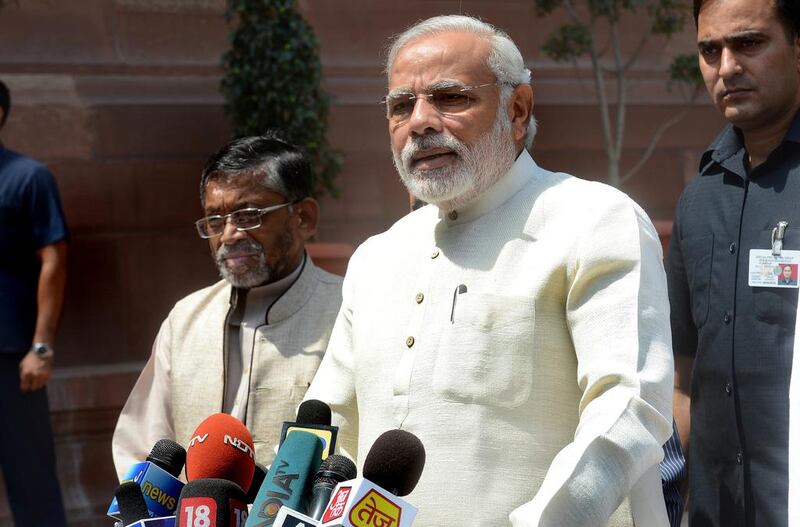NEW DELHI // In his first 100 days as India’s prime minister, Narendra Modi has been unexpectedly low-key, proving neither as bold as his supporters wished nor as divisive as his detractors feared.
When he took office on May 16, Mr Modi’s Bharatiya Janata Party (BJP) had just won a huge electoral mandate, bagging an absolute majority in the Lok Sabha, parliament’s lower house.
His election campaign was beset by controversy. His critics accused him of permitting, and even abetting, deadly anti-Muslim riots in 2002 while he was chief minister of Gujarat state.
For his part, Mr Modi stuck to a pro-business message, hinting that he would make tectonic changes to the way India's economy functions.
But in the realms of domestic politics and of economic and foreign policy, as prime minister, Mr Modi has thus far shown himself to be neither a polarising Hindu zealot nor a drastic economic reformer. The practical business of governing a complicated country has kept him from these ideological extremes.
"Modi got where he is due to his political savvy," said Vivek Dehejia, a professor of economics at Carleton University in Ottawa, Canada, and a frequent political and economic columnist for India's Business Standard newspaper. "And politically savvy politicians are, by definition, pragmatists, not ideologues."
Among the most closely scrutinised aspects of the past 100 days has been the status of Hindutva, the right-wing Hindu nationalism espoused by the BJP’s ideological parent, the Rashtriya Swayamsevak Sangh (RSS), to which Mr Modi once belonged.
Last week, RSS chief Mohan Bhagwat said in a speech that India “is a Hindu nation... Hindutva is the identity of our nation.”
In one way, the RSS’ influence over the BJP — always considerable -has begun to increase. Earlier this month, Amit Shah, the new president of the BJP and Mr Modi’s closest political ally, picked a new team to manage the party’s affairs. Eleven of its 14 vice presidents and seven of its eight general secretaries have RSS backgrounds.
But these appointments were likely to be compromises on the part of Mr Modi, in return for appointing Mr Shah, not considered an RSS man, as BJP president, said Vinod Jose, editor of New Delhi's Caravan magazine. "The BJP chief has often been installed by the influence of the RSS, and Mr Modi must have given the RSS these various other posts by way of concession forgiving Mr Shah the presidency of the party."
Mr Jose, the author of one of the most exhaustive profiles of Mr Modi, noted that the prime minister and his immediate circle had refrained from any overt attempts to polarise the public along religious lines.
“Partly, it’s a reflection of the fact that when you have a mandate to run India, you can’t blindly emulate what was a proven strategy for you in Gujarat,” Mr Jose said, pointing out that appealing directly to voters along religious lines was part of Mr Modi’s success in winning state elections in Gujarat.
But there are also important state elections, in Maharashtra, Haryana and Delhi, due to be held this winter, although the dates have not been set by the election commission. “So right now, they don’t want to be seen as a communally divisive party,” Mr Jose said. “That won’t work for them. They know they’re better off riding the narrative of economic development.”
The RSS has also traditionally adopted a hardline stance on Pakistan and its claims over Kashmir. Yet Mr Modi has shown an "inability to evolve a consistent and sustainable policy towards Pakistan," said Srinath Raghavan, a fellow at the Centre for Policy Research, a New Delhi-based think tank.
Mr Modi began his tenure by inviting the Pakistani prime minister, Nawaz Sharif, to his inauguration in an unprecedented gesture of amity.
But in a visit to Kashmir two weeks ago, Mr Modi thundered that Pakistan “has lost the strength to fight a conventional war, but continues to engage in the proxy war of terrorism”.
Last week, his government cancelled talks between the countries' foreign ministers after Pakistan's ambassador to India met with Kashmiri separatist leaders.
Mr Raghavan noted that Mr Modi’s overall foreign policy has shown considerable continuity with previous Indian governments.
For example, as prime minister, Mr Raghavan said, Mr Modi is “sending out a message that India is engaged with the [South Asian] region.”
Mr Modi recognises the importance of the BRICS grouping of fast-developing nations, which comprises Brazil, Russia, India, China and South Africa, Mr Raghavan added.
On the economic front, Mr Dehejia expected Mr Modi’s “pro-business, pro-market focus” to emerge over time, “in a way that is not necessarily ideologically driven or doctrinaire.”
Mr Modi's initial economic caution was evident in the budget presented in July by his finance minister, Arun Jaitley.
Mr Jaitley’s budget speech made clear the government’s commitment to minimise its fiscal deficit “resisting the advice of many sympathetic economists and commentators who had advised loosening the fiscal commitment,” Mr Dehejia said.
The strongest signal of Mr Modi’s affinity for a free market lay in his announcement, during his independence day speech on August 15, that he would scrap the government’s Planning Commission.
The commission dates back to India’s staunchly socialist decades, Mr Dehejia said, and its five-year economic plans are dissonant with the new reality “of an increasingly market-orientated economy, which, at least in theory, had moved beyond socialist-style central planning.”
As he settles into his role, and once the upcoming state elections are over, Mr Modi is likely to take stronger steps towards reviving the economy. The next budget, to be presented in March, will be the clearest signal yet of his economic road map.
ssubramanian@thenational.ae





